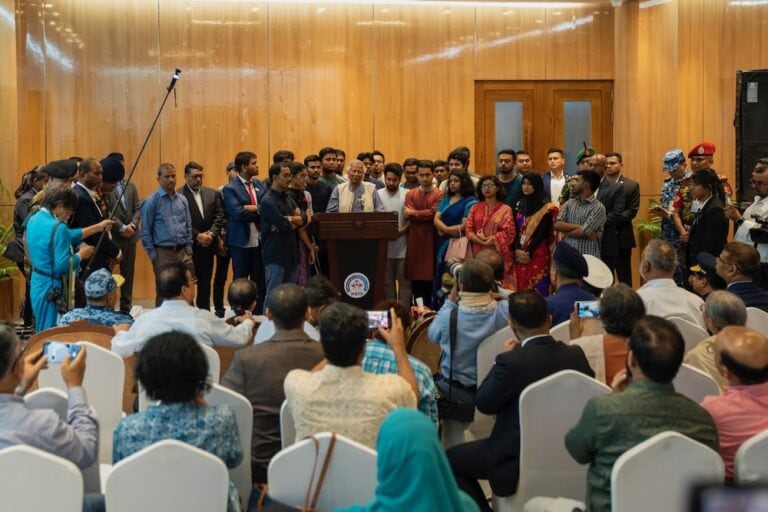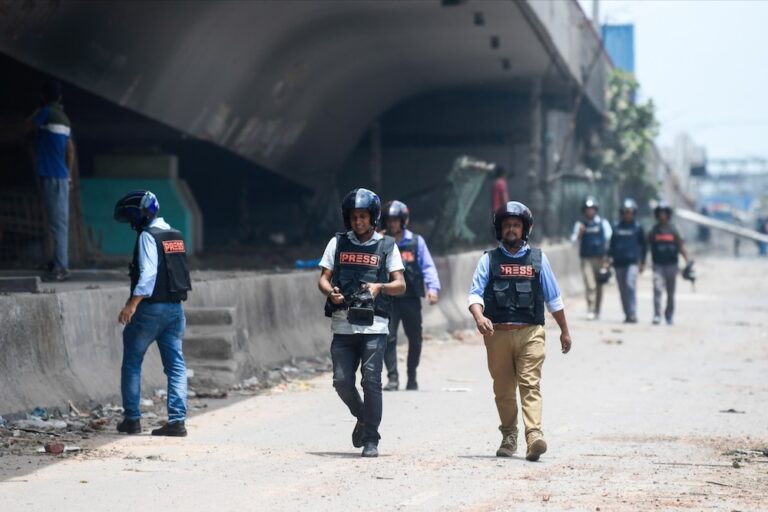(RSF/IFEX) – RSF has voiced its dismay over the arrest of magazine editor Salah Uddin Shoaib Choudhury. Choudhury was arrested in Dakha on 29 November 2003 as he was about to leave for Israel to take part in a symposium. He is accused of spying for Israel on the basis of the text of a […]
(RSF/IFEX) – RSF has voiced its dismay over the arrest of magazine editor Salah Uddin Shoaib Choudhury. Choudhury was arrested in Dakha on 29 November 2003 as he was about to leave for Israel to take part in a symposium. He is accused of spying for Israel on the basis of the text of a speech he was to have given on the media’s role in the dialogue between Muslims and Jews. He could be charged with “sedition”, a crime that is punishable by death in Bangladesh.
“While the international community is debating a new peace plan for the Middle East, the government of Bangladesh has decided to arrest a journalist who advocates a peaceful solution to the conflict,” RSF said in a letter to Foreign Minister Morshed Khan, calling on him to intercede to get Choudhury released on bail.
Choudhury, who is editor of the weekly entertainment magazine “Blitz”, was detained by police at Dakha airport as he was about to board a flight to Tel Aviv via Bangkok. A Dakha judge has granted the police permission to detain him for seven days. He is reportedly being held in Dhaka’s Cantonment police station, where secret service officers are said to be interrogating him in an attempt to get him to admit he is spying for Israel.
Choudhury was recently named as head of the Bangladeshi branch of the International Forum for the Literature and Culture of Peace (IFLAC), an organisation of writers who campaign for peace. He was to have given his speech on 1 December in Tel Aviv at a symposium held by the Hebrew Writers Association.
His participation would have been a first for a Bangladeshi journalist. Bangladesh and Israel have no diplomatic relations and Bangladeshis do not have the right to travel to Israel. In his speech, Choudhury was to have stressed the key role that the news media in Muslim countries have to play in constructing peace in the Middle East.
The secret services claim that documents found in Choudhury’s briefcase – especially the text of his speech and reports on the human rights situation in Bangladesh – are evidence of his spying on behalf of Israel. A few hours after his arrest, police seized all the computer equipment, including printers and CD-ROMs, at the offices of his magazine and his home.
IFLAC President Ada Aharoni told RSF by telephone that her organisation has no links with the Israeli authorities. She said she deeply deplored Choudhury’s arrest, which she described as an unwarranted attack on an advocate of dialogue between Muslims and Jews. IFLAC recently held a symposium that brought together Muslim and Jewish intellectuals in Turkey.


